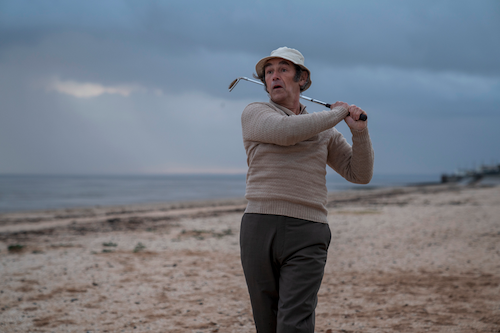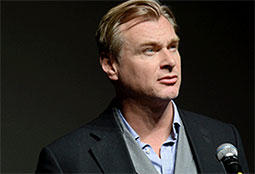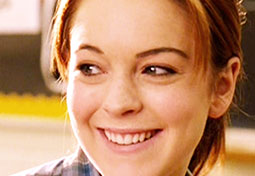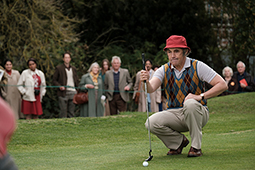
The Phantom of the Open is a spirited and poignant salute to "the world's worst golfer", Maurice Flitcroft. Oscar-winner Mark Rylance plays the tenacious shipyard worker who manages to bluff his way into the 1976 British Open Golf Championships, aggravating the establishment at the same time as he inspires his loyal wife, Jean (Sally Hawkins).
The Phantom of the Open is directed with brio by Submarine star Craig Roberts, and it's adapted by Paddington 2 writer Simon Farnaby from his biographical book of the same name. We caught up with Simon to discuss the outrageous aspects of Maurice's life that didn't make it to the final cut of the film, plus the gently inspirational message that comes with following one's dreams in the absence of actual talent.
You've adapted the movie from your own book. Do you remember Maurice Flitcroft being on the TV when he was at his 'peak', so to speak?
No, although I grew up around golf. My dad was a greenkeeper so I played golf as a junior. My first memory of Maurice was hearing about this guy who had entered the British Open and done very badly. So, if there was a particularly bad golfer amongst the juniors, or even the seniors, they were known as a 'Flitcroft'.
Then, I sort of forgot about him until 2007 and I read that he'd died. There was an obituary in the paper. In fact, all the broadsheets ran obituaries. It made me think why I'd never heard of him in the past 30 years. At that point, there wasn't even very much on Google. Anything on YouTube is stuff that we've put together subsequently.
Scott Murray, with whom I wrote the book, found that footage from America, and the TV AM footage, shown at the end of the film, isn't even available on YouTube. That's our footage that we got from ITV. It's priceless. We should put it online once we get permission because it's hilarious. It's a good seven or eight minutes of [English comedian] Tom O'Connor making jokes about how rubbish Maurice is, and Maurice is getting increasingly angry.
I wanted to put that segment in its entirety in the movie, but obviously, they wouldn't let us put eight minutes' worth at the end of the film. We had to just show a clip.
I was speaking to Craig Roberts and he said that the end credits footage is an important validation of everything we've seen in the film. It confirms that this amazing story is, indeed, true. When it came to the script, how did you mix up the more outrageous aspects of Maurice's life with the plausible details?
You know what, it's tricky because I actually wrote a screenplay before I wrote the book. And then I wrote so many versions of the screenplay. There were so many outrageous things that we didn't put in the film.
He did spend time as a comedy high diver. He was so desperate to get out of the shipyard, he joined a diving troupe. He told them he could do a perfect pike dive. And they put him into this show, and he fell off the diving board and broke all his teeth. That's why he had false teeth. And this was in the script originally.
He also wrote pop songs. He went to EMI Offices in London with all these songs he'd written. They said, 'It's all very well but where's the tune?' He then replied: 'You can do that, can't you?' He was also a painter and he spoke lots of languages. He kept trying to do things but actually, we had to narrow it down in the film. [laughs] We could have filled half an hour with what he tried to do before he turned his hand to golf.
He found golf later on in life. He'd given up on his dreams of doing something else, and then he found golf and that was it. It was a case of taking a quite unbelievable story and trying to make it believable. He was always getting arrested or getting shot at. Actually, we had to take some of those things out because people wouldn't believe it. What you're left with is pretty much the bare bones of what people will actually believe. [laughs]
The bare-bones still give us a glimpse at how utterly tenacious he was. I did enjoy the generosity of spirit in your script, focusing on Maurice's ability to speak different languages and so forth. He's conversant with Seve Ballesteros as we see in the film.
Yeah, he was lampooned by the media but I don't think the journalists lampooning him could speak the languages that he could. He knew all the classics. He read and re-read Charles Dickens and William Shakespeare.
We got hold of his unpublished autobiography, which informed a lot of the book. Maurice Flitcroft's autobiography was called 'The Phantom of the Open' and so was ours, in tribute to him. There's an important bit in his autobiography where he says he was evacuated during World War II as a kid and he went to stay with a very well-to-do family. They had a totally different philosophy. They had money and were like, 'You can be whatever you want to be, young Maurice, so what is that?' He learned the violin and languages.
So, when he went back to Barrow, he just kept that going. It became his philosophy for life. But he was in the wrong place. [laughs] The only place was the shipyard. It was a great thing to find that, because I often ask myself, 'Why did he do what he did?' And it's there in the film. For a brief moment, he had a window into another life. And that was what he ran with.
"We had to take some things out because people wouldn't believe it. What you're left with is pretty much the bare bones of what people will actually believe."
The visual flourishes in the movie are wonderful, including the moment where Maurice imagines that he's teed off spectacularly, only for the ball to land five feet away. It's very funny but also poignant. Were moments like that on the page to begin with? Or did that come out of the collaboration between Craig and yourself?
Yeah, I'd always had this Billy Liar-type vision. Maurice was going to have these flights of fancy. But to answer your question, Craig really brought those moments to the fore.
I wasn't sure about them and I wasn't sure whether they were the right thing or not. I put in the stage directions, 'He closes his eyes and imagines the ball flying down the fairway.' But I wasn't sure if one would see that or not, or how it would work. And when Craig came along, he absolutely wanted to include those moments. Let's have flights of fancy and dream sequences because Maurice is a dreamer.
They turned out so much better than I could ever have imagined. That's why I'm not a director and why Craig is. He took those moments and ran with them. We were talking for a while about bringing in a director who would do a gritty, Ken Loach-style take on Maurice's life. Working-class, kitchen sink, that kind of thing.
Thankfully, Craig came along and insisted that it remain colourful and fun. Lots of movement akin to a Coen brothers film or other American filmmakers such as Paul Thomas Anderson. That, for me, was gold. I didn't want it to be a depressing film about a poor guy who dared to dream! [laughs] It was meant to be a celebration and that's what Craig brought to it.
The movie is very funny but I think the pathos is what gives it the edge, the triumph of the so-called little man against the odds. You're also in the film as Lambert, a golfer. Was he based on someone who had played next to Maurice in real life?
Maurice played with two guys. One of the guys wasn't very happy to be playing with him. That's who I was representing. [laughs] For people who were actually there with him on that day, it wasn't very funny. I say that, but some people we talked to were fine about it. They thought it was hilarious. It was clear he didn't belong there.
For others, however, he was an embarrassment and he took the place of someone else who could have been there. Actually, that's not true because Fornby was actually an off-shoot, so they could have had more professionals there on that day. They were already full on another course. But yeah, not everyone found it as amusing as we do now. I was there representing that particular type of golfer.
In your script for this film, and also in your script for Paddington 2, which you co-wrote with Paul King, you celebrate togetherness and solidarity. There's a hopeful message in both scripts. Is that a theme that you like exploring?
The similarity lies in the fact that Paddington believes in community. He helps his neighbours and that's his philosophy. He wonders if he's done the right thing and in the end, the neighbours come and thank him.
Maurice has a similar sort of story. He's slightly more individualistic than Paddington. Maurice had this belief in being himself and going for one's dreams, which he instilled in others. But in both movies, you're led to believe that the respective philosophies have failed. And then at the end, it turns out not to have failed. So, you're right in that respect.
I suppose this movie is about community. One of my favourite films is It's a Wonderful Life and I once read something about mass acts of kindness that's been corroborated by psychology. There's something about seeing lots of people being together as one on some sort of cause that gives you a sense of emotion. It must be a primal thing.
Maurice spent a lot of time on his own with just his wife for company. And then in the film, without giving too much away, there's a sense that he was never alone. His message had got out there, and hopefully, it's very uplifting to see.
"Maurice Flitcroft had this belief in being himself and going for one's dreams, which he instilled in others."
Has our interview made you want to see the film? Then click here to book your tickets for The Phantom of the Open, which is released in Cineworld on March 18th. Don't forget to tweet us @Cineworld with your thoughts on both the movie and our interview.











.jpg)


.jpg)
.png)






